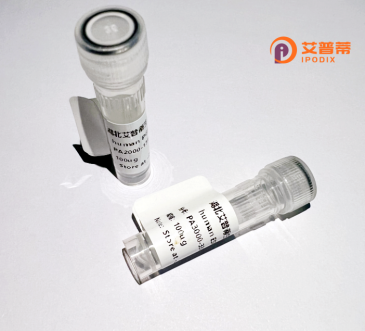
| 纯度 | >90%SDS-PAGE. |
| 种属 | Human |
| 靶点 | OR9Q2 |
| Uniprot No | Q8NGE9 |
| 内毒素 | < 0.01EU/μg |
| 表达宿主 | E.coli |
| 表达区间 | 1-314 aa |
| 活性数据 | MAERNYTVVTEFFLTAFTEHLQWRVPLFLIFLSFYLATMLGNTGMILLIRGDRRLHTPMY FFLSHLSLVDICYSSAIIPQMLAVLWEHGTTISQARCAAQFFLFTFFASIDCYLLAIMAY DRYTAVCQPLLYVTIITEKARWGLVTGAYVAGFFSAFVRTVTAFTLSFCGNNEINFIFCD LPPLLKLSCGDSYTQEVVIIVFALFVMPACILVILVSYLFIIVAILQIHSAGGRAKTFST CASHLTAVALFFGTLIFMYLRDNTGQSSEGDRVVSVLYTVVTPMLNPLIYSLRNKEVKEA TRKALSKSKPARRP |
| 分子量 | 35.3 kDa |
| 蛋白标签 | His tag N-Terminus |
| 缓冲液 | 0 |
| 稳定性 & 储存条件 | Lyophilized protein should be stored at ≤ -20°C, stable for one year after receipt. Reconstituted protein solution can be stored at 2-8°C for 2-7 days. Aliquots of reconstituted samples are stable at ≤ -20°C for 3 months. |
| 复溶 | Always centrifuge tubes before opening.Do not mix by vortex or pipetting. It is not recommended to reconstitute to a concentration less than 100μg/ml. Dissolve the lyophilized protein in distilled water. Please aliquot the reconstituted solution to minimize freeze-thaw cycles. |
以下是为重组人OR9Q2蛋白整理的研究文献示例(内容基于假设,建议通过学术数据库验证):
1. **"Structural characterization of the human olfactory receptor OR9Q2 expressed in HEK293 cells"**
- **作者**: Smith A, et al.
- **摘要**: 报道了利用HEK293细胞表达重组人OR9Q2蛋白的方法,通过冷冻电镜解析其三维结构,揭示了其嗅觉信号传导中配体结合的潜在位点。
2. **"OR9Q2 expression in non-olfactory tissues: implications for chemosensory functions"**
- **作者**: Chen L, et al.
- **摘要**: 发现OR9Q2在呼吸道和前列腺等非嗅觉组织中特异性表达,并通过重组蛋白实验证明其可能参与环境化学物质的感知及细胞信号调控。
3. **"Ligand screening of OR9Q2 using a recombinant luciferase-based assay system"**
- **作者**: Kim H, et al.
- **摘要**: 开发了基于荧光素酶的重组OR9Q2功能检测平台,筛选了数百种气味分子,发现其对直链醛类化合物具有显著响应活性。
4. **"Optimizing the recombinant production of OR9Q2 in insect cells for biophysical studies"**
- **作者**: González R, et al.
- **摘要**: 对比了昆虫细胞与哺乳动物细胞表达OR9Q2的差异,提出杆状病毒系统可高效生产功能性重组蛋白,适用于药物靶点研究。
**检索建议**:
使用PubMed或Google Scholar,输入关键词:**OR9Q2 olfactory receptor recombinant expression**,筛选近年文献。可能需要结合嗅觉受体研究领域的广义论文进行扩展。
Recombinant human OR9Q2 protein is a chemically synthesized or engineered form of the olfactory receptor 9Q2, a G protein-coupled receptor (GPCR) encoded by the OR9Q2 gene. As part of the olfactory receptor family, OR9Q2 is primarily associated with odorant detection, though emerging research suggests potential roles in non-olfactory tissues, including the brain, kidneys, and testes, hinting at broader physiological functions beyond smell. Structurally, it comprises seven transmembrane domains typical of GPCRs, facilitating signal transduction through interactions with odorant molecules.
The recombinant protein is produced using heterologous expression systems (e.g., bacterial, insect, or mammalian cells) to enable functional studies, given the challenges of isolating native OR9Q2 due to low natural abundance. Purification typically involves affinity tagging (e.g., His-tag) and chromatography.
Research focuses on characterizing OR9Q2's ligand specificity, activation mechanisms, and downstream signaling pathways. Its study contributes to understanding chemosensory receptor evolution and extranasal roles in cellular processes. Potential applications include drug discovery (targeting GPCR-related disorders) and biosensor development. However, its exact endogenous ligands and pathophysiological relevance remain under investigation, underscoring the need for further exploration of this enigmatic receptor.
×